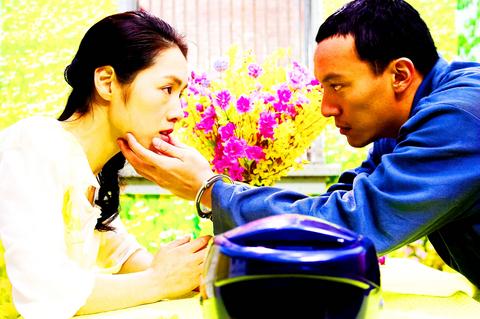Once notorious for dealing with extremity and violence in films such as Bad Guy, South Korean auteur Kim Ki-duk goes for something less disturbing with his latest and 14th feature Breath. This movie, tinted with a quiet and bewildering tone, tells the story of an eccentric romance between a housewife and a condemned criminal.
The film begins with a splash of blood when death row prisoner Jang Jin (Chang Chen, 張震) attempts to take his own life by stabbing himself in the throat with a sharpened toothbrush. The news of his suicide attempt captures the attention of disaffected housewife Yeon (Zia), who passes time doing monotonous housework and sculpting in an immaculate, sterile apartment in Seoul.
Trapped in a loveless marriage with an unfaithful husband, played by Ha Jung-woo, Yeon goes to visit the condemned man on an impulse and reveals her own near-death experience when she held her breath underwater as a child.

PHOTO: COURTESY OF JETTONE FILMS LIMITED
It's the first of several visits during which she redirects her creative abilities into wallpapering and decorating the visiting room and entertaining Jang with a song each time she meets him.
Never speaking a word in return, the man watches the woman curiously and is drawn closer to her each time. Meanwhile, the jail's nameless and faceless overseer, played by the director, takes an unusual interest in observing the two through surveillance cameras.
Agitated by the unforeseen turn of events, the husband struggles to restore orderliness inside the house without much success. One of Jang's cellmates, however, resorts to a more radical method to vent out his homoerotic yearnings for the doomed man.
One of Kim's sparsest works, the film has a cold and unemotional feel with an equally cold and wintry palette, occasionally brightened by spatterings of color when Yeon visits the prison. Though straightforward and realistic in execution, the unflattering picture relies on repetition and minimal dialogue to explore the mysteries of the human mind and heart.
Taiwanese actor Chang turns in a competent performance, employing only bodily gestures and facial expressions to depict the mute prisoner that is much akin to his reticent and melancholy onscreen persona in films by Hou Hsiao-hsien (侯孝賢) and Wong Kar-wai (王家衛). With an unconventional face, the South Korean actress, who goes by the single name Zia, adds more intensity to the story with her catatonic performance. One part that fails, however, is the warden, played by the director himself. The omnipresent prison head seems to deliver little significance to the plot and functions as a script device.
Audience members who expect the film to make sense in accordance with the rules of mainstream storytelling, will be bit frustrated as the characters' backgrounds and motivations are never fully explained. The reason behind the woman's connection with the prisoner and her fascination with death are left unexplored. The crime for which Jang is on death row is only revealed near the end and its enormity seems jarring compared to the sympathetic lead.
Such lack of character expositions is typical of Kim's works, which usually follow a curious logic, valid in their own terms. In the case of Breath, the director contemplates the inability to communicate in his attempt to express the inexpressible through a peculiar and obsessive relationship.

Some people will never forget their first meeting with Hans Breuer, because it occurred late at night on a remote mountain road, when they noticed — to quote one of them — a large German man, “down in a concrete ditch, kicking up leaves and glancing around with a curious intensity.” This writer’s first contact with the Dusseldorf native was entirely conventional, yet it led to a friendly correspondence that lasted until Breuer’s death in Taipei on Dec. 10. I’d been told he’d be an excellent person to talk to for an article I was putting together, so I telephoned him,

On the Chinese Internet, the country’s current predicament — slowing economic growth, a falling birthrate, a meager social safety net, increasing isolation on the world stage — is often expressed through buzzwords. There is tangping, or “lying flat,” a term used to describe the young generation of Chinese who are choosing to chill out rather than hustle in China’s high-pressure economy. There is runxue, or “run philosophy,” which refers to the determination of large numbers of people to emigrate. Recently, “revenge against society” attacks — random incidents of violence that have claimed dozens of lives — have sparked particular concern.

From an anonymous office in a New Delhi mall, matrimonial detective Bhavna Paliwal runs the rule over prospective husbands and wives — a booming industry in India, where younger generations are increasingly choosing love matches over arranged marriage. The tradition of partners being carefully selected by the two families remains hugely popular, but in a country where social customs are changing rapidly, more and more couples are making their own matches. So for some families, the first step when young lovers want to get married is not to call a priest or party planner but a sleuth like Paliwal with high-tech spy

With raging waters moving as fast as 3 meters per second, it’s said that the Roaring Gate Channel (吼門水道) evokes the sound of a thousand troop-bound horses galloping. Situated between Penghu’s Xiyu (西嶼) and Baisha (白沙) islands, early inhabitants ranked the channel as the second most perilous waterway in the archipelago; the top was the seas around the shoals to the far north. The Roaring Gate also concealed sunken reefs, and was especially nasty when the northeasterly winds blew during the autumn and winter months. Ships heading to the archipelago’s main settlement of Magong (馬公) had to go around the west side